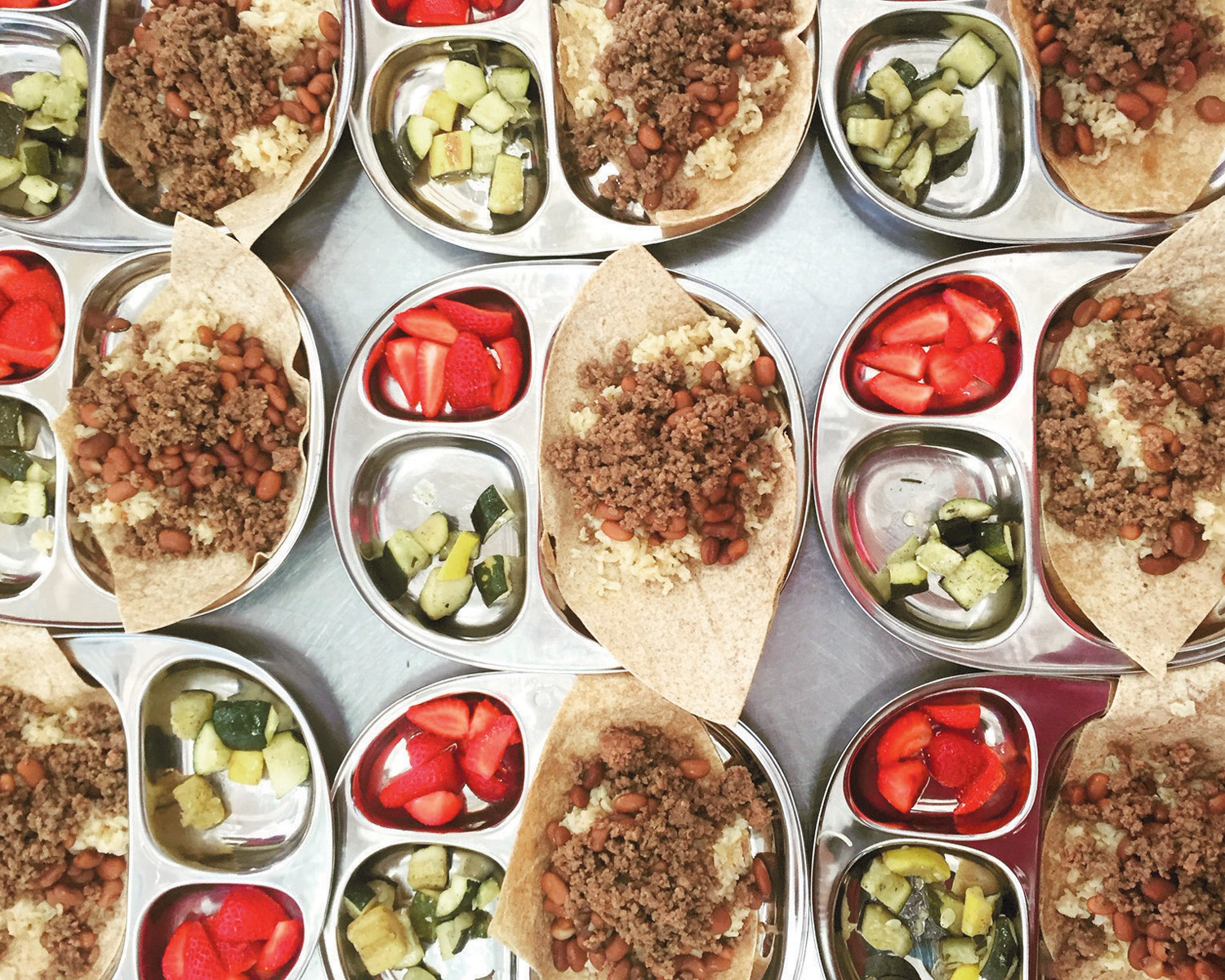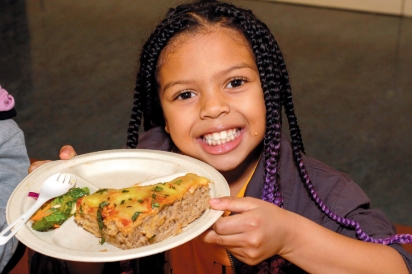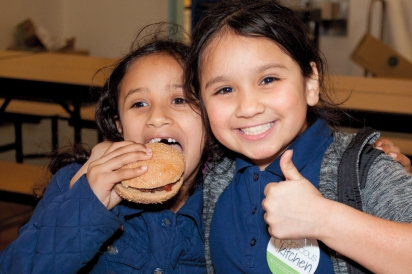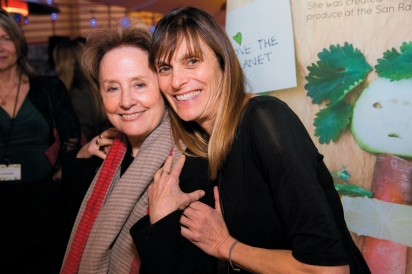Transforming School Lunches, One "Conscious Kitchen" at a Time
In 2013, Conscious Kitchen founder Judi Shils, Chef Justin Everett (then executive chef of Sausalito’s Murray Circle at Cavallo Point Lodge) and the kitchen team from Marin City’s Bayside Martin Luther King Jr. Academy served an all-organic, nutritious and delicious hot lunch to the school’s student body and staff. It should not have been a groundbreaking event, but it was.
To mark the momentous occasion, the tables were set with white tablecloths, real china plates, silverware and glassware, and flowers. The centerpiece of the menu was Everett’s Quinoa Mac n’ Cheese, custom-designed for the youthful palate and now the stuff of legend.
“The kids felt so honored and dignified and proud,” says Shils. “They were served by beautiful humans who loved them. They ate and got seconds and ate more, and there was no waste. We watched the whole tenor of the cafeteria completely transform.”
Shils, also the founder of the nonprofit environmental organization Turning Green, had seen first-hand the poor quality of the highly processed “heat and serve” meals being served to students at public schools around the state and became convinced that something had to be done. Reaching out to her mighty network of friends and collaborators, she gathered a team and gained permission from the Sausalito Marin City School District (SMCSD) and Bayside MLK Academy administration to try something different, for just one week. Thus, Conscious Kitchen was born.
As the SMCSD superintendent and Bayside MLK’s principal and vice principal observed the students eating made-from-scratch, healthy, whole-grain and plant-based organic meals that first week, they were moved to tears. “‘Please can we do this for the year?’ they asked,” remembers Shils.
That was six years ago, and since that first meal at Bayside MLK Academy, Conscious Kitchen has served 538,200 fresh, locally sourced, organic, seasonal and non-GMO (known by the acronym “FLOSN”) meals to students at not only Bayside MLK Academy, but also at Willow Creek Academy in Sausalito (for the past four years) and Peres Elementary School in Richmond (a one-year pilot program in 2018).
The goal is to create an affordable and scalable model in order to collect data and demonstrate success—to show other schools not only in California but across the nation that school lunches can, and must, be reformed. The heat-and-serve model, say Shils and her many allies, is the product of outdated school district contracts with largescale ag and food service providers, rather than the prioritization of children’s health.
The Conscious Kitchen team believes that all students, no matter the wealth of their school district, should have access to FLOSN meals.
“I would emphasize that we don’t have a choice right now as a society. This is urgent, not only for the health of our children, but also to stabilize the climate,” says Conscious Kitchen Program Director Debbie Friedman. Friedman, an attorney with a background in food justice and environmental advocacy, believes we must hold our public officials accountable for the health and wellness of future generations.
“Schools are one of our last operating democratic institutions where we have power,” she says. “These are public dollars we are using for school meals. It is important to remind people: This is our money, our tax dollars, and we have the right to use funds for the public good.”
The urgency around school meal reform is increasing on several fronts. First, the health of our children is at stake. According to the Centers for Disease Control, one-third of children ages 2–19 across the country are overweight or obese. One in 13 children have food allergies, a 50% increase over the past two decades, and a remarkable 45% of new-onset cases of Type 2 diabetes are adolescents, when 10 years ago it was only 3%. One in 10 Americans with Crohn’s disease and colitis is a child, and 24% of middle schoolers across the nation suffer from IBS (irritable bowel syndrome).
These numbers are extraordinary—and science links these outcomes directly to diet. According to a 2017 National Alliance for Nutrition and Activity report, based on the Center for Disease Control data, “The average daily sodium intake for children is 3,300 milligrams before salt is added at the table. The 2015-2020 Dietary Guidelines for Americans recommends that children aged 1–18 years consume 2,300 milligrams per day.” And a 2010 report by the same group, based on two decades of USDA surveys, found that “85% of children consume more saturated fat than is recommended in the Dietary Guidelines for Americans, and over two-thirds of all foods consumed by school children are foods that are recommended for occasional consumption.”
In 2010, Michelle Obama championed the health of school children, leading to the Healthy Hunger-Free Kids Act of 2010 and an updated USDA policy requiring schools to improve the nutritional quality of cafeteria meals with whole grains as well as milk options and sodium reduction. But in 2017, the Trump administration’s USDA opted to reverse those requirements and delay implementation of the reduced sodium requirement.
Widespread opposition among physician groups and public health policy advocates across the nation cite research from Harvard University’s T.H. Chan School of Public Health, which estimated that the updates to school nutrition standards would prevent more than 2 million cases of childhood obesity and save up to $792 million in health-care related costs over 10 years. In January 2018, a consortium of scientists from across the nation signed a letter expressing serious concern about exciting lunch standards, stating, “Nine out of ten children consume excess sodium. Excess sodium consumption is strongly associated with the development and worsening of high blood pressure and an increased risk of coronary heart disease, stroke, heart failure, kidney failure, gastric cancer, and osteoporosis.”
Currently 3.5 million California schoolchildren (58%) depend on free and/or reduced-price school meals. It is likely that a large segment of this group is getting a significant portion of their daily nutrition from the school kitchen—making it all the more critical.
As anyone who has ever been sick understands, when we are not well we cannot concentrate or learn. As we measure and fret about our students’ academic performance, school lunch reform advocates say we must first consider the foundation of children’s wellness: their meals.
The second reason for urgency is environmental. Conscious Kitchen partner, The nonprofit Friends of the Earth, a Conscious Kitchen partner, recently published a report entitled “Scaling Up Healthy, Climate Friendly School Food.” This report summarizes findings across four school districts that implemented climate-friendly, plant-based and plant-forward options. One example is the Novato School District, where once a week Food Service Director Miguel Villareal substitutes a Morningstar veggie burger for a beef burger. The district pays more for the veggie burger—because the beef patty is highly subsidized per the Farm Bill—but that substitution has prevented an estimated 1.3 million pounds of carbon dioxide emissions over the course of 10 years.
In Oakland and Santa Barbara, as well as in Florida and Colorado, school districts are finding ways to reduce water usage and carbon footprint, primarily by shifting their menu to include more protein-rich legumes and vegetables.
“The climate change issue is a lever. Schools can use their purchasing power as a lever to shift food supply and accelerate conversion to climate-friendly farming,” says Conscious Kitchen’s Friedman. “In addition to children’s health and wellness benefits, the business community is especially interested in the climate change connection.”
Indeed, Conscious Kitchen has assembled an impressive array of corporate partners, including local standouts Urban Remedy, Numi, Clif Bar, Equator Coffees and Teas and Patagonia Provisions. Clover Sonoma worked with Conscious Kitchen to implement a Junior Cooking Challenge educational program at McKinley Elementary School in Petaluma earlier this year. [For more on the Junior Cooking Challenge, read the online version of this story at EdibleMarinAndWineCountry.ediblecommunities.com/foodthought.] Good Earth Natural Foods, and in particular Good Earth partner Al Baylacq, has been a mentor and major supporter of Conscious Kitchen since the start. And more partners are on the way.
“The momentum right now is mind-blowing,” says Friedman. “People from all different sectors, including researchers and various stakeholders involved—not just the usual suspects, a broad contingency are supporting our work, and both the environmental and social justice aspects are resonating across the board.” Nonprofit partners include the Natural Resources Defense Council, the Community Alliance of Family Farmers, California Food & Farming Network School Food Working Group, Chez Panisse founder Alice Waters and her Edible Schoolyard, Friends of the Earth and the Marin Community Foundation, as well as research institutions such as the Berkeley School of Public Health, London School of Medicine and UCSF, specifically Dr. Jennifer Rienks of the Family Health Outcomes project, who has tracked the outcomes of the Peres school pilot project.
California Assemblyman Marc Levine (D–San Rafael), who lunched with the Peres Elementary School students last spring, broadcast his support of Conscious Kitchen and Alice Waters, tweeting “How do we get healthy nutritious food to our kids? @TurningGreen and @AliceWaters are doing it with delicious, locally grown, sustainable organic meals every day. We can do this for every student in California.”
Beyond the for-profit corporate interests that have dominated school food service contracts since President Truman established the National School Lunch Act in 1946, it is difficult to find a sector opposed to school lunch reform. And the needle is beginning to budge. Here in California, Assembly Bill 479 was approved by the Senate Education Committee last July, the first-ever bill to support climate-friendly school food. This bill, which would provide state funding to reimburse K–12 public schools as they expand their plant-based food and beverage offerings, including some funds for training kitchen staff (to actually cook), now moves to the Senate Appropriations Committee and has a chance to make it into Governor Newsom’s budget next year. If passed, it would offer a national precedent for an incentive program for plant-based foods.
Meanwhile, the Conscious Kitchen team is looking ahead toward comprehensive legislation that would revolutionize the way public schools purchase and serve food, and are working on the ground in Sausalito and West Contra Costa to prove that a short-term investment makes long-term sense for our children and environmental health.
In 2015, Sausalito-Marin City, a small district with two schools and 558 students, became the first district to serve 100% organic meals. In the West Contra Costa County Unified School District, a district of 31,000 students, where 70% of the students qualify for free or reduced-price meals and half of the students are overweight or obese, the goal is more ambitious. The Conscious Kitchen pilot at Peres showed that the price of a FLOSN meal can be brought down to $1.24/student for breakfast and $1.58/student for lunch. While West Contra Costa Superintendent Matt Duffy and Food Service Director Barbara Jellison are eager to expand the pilot, the primary barrier to implementation throughout the district is labor costs, which are six times higher due to the need to retrain the district’s kitchen staff to cook from scratch.
Determined to establish a scalable model and track outcomes in a large district with low-income students, the Conscious Kitchen team and partners are currently fundraising to cover those added costs.
Studies, metrics and proven scalability are critical to drive public policy and legislative reform. What cannot be as easily quantified is the student experience, and this is perhaps the most compelling reason for change. Guillame Pfahl, referred to fondly as “Chef G,” runs the Conscious Kitchen program at Willow Creek Academy in Sausalito and sees up close the way that a chef cooking on site nurtures students’ connections with and interest in the food they are served.
“As we cook, it provides smells, smells that get the kids excited throughout the day. They smell muffins baking, they see us in the kitchen cooking. There is buildup and they get so excited to see what the meal will be.”
At times, students are perplexed by the dish, says Pfahl, and this offers a learning opportunity. For instance, Pfahl makes nachos with a bechamel white sauce. “When they ask, ‘What’s this? Why isn’t the sauce yellow?’” he says, “I explain that this is how the cheese is, a natural white cheddar without any dyes.” Now, he says, his version of nachos is a crowd favorite.
“The way that the school lunch program in the United States has gone is not the best for our kids,” says Pfahl. “Cooking for the kids here is my favorite job I have ever had. The kids are so appreciative, and seeing their faces when they eat. We need to remember, these are our future leaders. We need to set them up for success by giving them the fuel they need to learn and to develop properly. All kids should be able to eat this way.”











